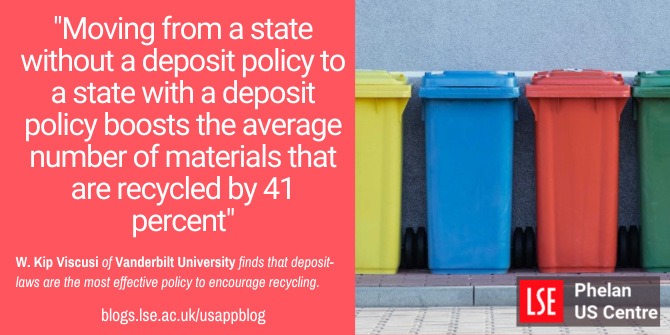 Many US cities and communities have offered some form of recycling program for decades, but which policies are the most effective at encouraging households to recycle? In new research, W. Kip Viscusi examined the recycling behavior of almost 1,500 US households who moved to states with different recycling policies. He finds that moving from a state without a deposit policy to a state with one increased household recycling by 41 percent, while moving to states with other policies increased recycling rates by 9 percent. He also finds that recycling behaviors are ‘sticky’; moving to a state with less favorable recycling policies only decreases recycling rates by 13 percent.
Many US cities and communities have offered some form of recycling program for decades, but which policies are the most effective at encouraging households to recycle? In new research, W. Kip Viscusi examined the recycling behavior of almost 1,500 US households who moved to states with different recycling policies. He finds that moving from a state without a deposit policy to a state with one increased household recycling by 41 percent, while moving to states with other policies increased recycling rates by 9 percent. He also finds that recycling behaviors are ‘sticky’; moving to a state with less favorable recycling policies only decreases recycling rates by 13 percent.
Recycling policies have been in place in the US for decades. However, in part because of the stability of these policies over time, it has been difficult to identify which policies are effective and which are not. One strategy for doing so is to look at what happens to recycling behavior when people move to states with different policies since many of the most prominent policies are governed by state laws. My new research with Joel Huber and Jason Bell uses this approach by comparing the pre- and post-move recycling behavior of almost 1,500 US households. The household’s own environmental preferences should be relatively stable over time so if recycling is only dependent on the household’s preferences there should be no change in recycling after the move. However, the change in the recycling environment and the accompanying social norms may affect recycling rates, providing a measure of the impact of recycling policies.
Recycling policies in the US
The two most prominent types of recycling policies are deposit laws and recycling laws. US deposit laws are generally a 5-cent deposit on beverage containers that can be returned to obtain a refund. There are 11 states that have such deposit laws. The second broad category of laws are more general recycling laws that do not provide financial incentives for recycling. These efforts are more diverse. The weakest recycling laws are imposed by 21 states that either have no recycling laws or else have laws that declare a recycling goal but do not impose any requirements on municipalities. The next group consists of a more ambitious set of laws that requires municipalities to develop a recycling plan. There are 15 states in this group. Finally, there are 14 states (and the District of Columbia) that either make recycling mandatory or require that municipalities provide residents with the opportunity to recycle.
What happens to households’ recycling rates when they move states?
We measured the impact of recycling policies by examining data on the number of different types of materials that each household recycles: paper, plastic, cans, and glass. Easily the most effective recycling policy in terms of boosting the average number of materials that are recycled is that of financial incentives. Moving from a state without a deposit policy to a state with a deposit policy boosts the average number of materials that are recycled by 41 percent. Recycling rates for cans rise by 48 percent, recycling rates for glass rise by 47 percent, and recycling rates for plastic risk by 37 percent. It is not surprising that deposit policies increase recycling rates for products for which there is a deposit. What is also interesting is that deposit policies also increase recycling rates for paper products by 30 percent. In effect, deposit policies encourage people to become vigilant recyclers more generally, as people also tend to develop recycling practices that extend beyond the products for which there are financial incentives.
Recycling laws also are influential. Laws that simply declare recycling goals are largely ineffective. However, recycling laws that require the development of recycling plans, provision of recycling opportunities, or make recycling mandatory do boost recycling rates. Moving to states with more stringent laws raises recycling rates by an average of 9 percent. The effects of these laws are strongest for glass, which increases by 17 percent, and for cans, for which the recycling rate increases by 10 percent.

Photo by Pawel Czerwinski on Unsplash
Diminished effects on recycling when households move to states with less favorable policies
These results focus on what happens to behavior when people move to areas with policies that are more conducive to recycling. But what happens when people move out of such areas to less favorable recycling environments. Is there a comparable decline in recycling rates that occurs? Moving out of a beverage deposit state only diminishes recycling rates by 13 percent, or less than one-third of the increase in recycling rates that occurs with a move into a deposit state. Similarly, moving out of a stringent recycling law state depresses recycling rates, but the only material for which there is a statistically significant impact is plastic, which declines by 12 percent.
This asymmetry in the effect of moves into and out of strong recycling states is not surprising. Although our research focuses only on households that made interstate moves, we also have data that tracks household recycling behavior using 380,000 annual observations of household recycling behavior that was reported over a ten-year period. Households’ recycling behavior tends to be very stable. Because of this stability, there is less backsliding than one might expect from moving out of a pro-recycling environment.
Because deposit laws and more stringent recycling laws are each potentially effective, one might expect that having both sets of laws would have a powerful interactive effect, boosting recycling rates more than one would expect from the individual policies. Alternatively, these policies might cannibalize each other, diminishing their total impact. Our results indicate that neither of these interactions occur; the effects off recycling policies add up, but the effects are no greater than they would be if they were implemented separately.
Detailed examinations of other influences potentially at work finds that deposit policies and laws are responsible for the changes in recycling behavior. Households planning moves to a state with stronger recycling policies do not boost their recycling rates in advance of the move. Political factors that one might believe are correlated with recycling policies, such as whether the state government is controlled by Democrats or Republicans, also do not account for whether the different laws are influential.
Recycling rates respond to policy interventions in a sensible way. Financial incentives matter, as do policies that facilitate household’s recycling by reducing the time and effort costs of recycling.
- This article is based on the paper, ‘Quasi-Experimental Evidence on the Impact of State Recycling and Deposit Laws: Household Recycling Following Interstate Moves’ in American Law and Economics Review
- Please read our comments policy before commenting.
- Note: This article gives the views of the author, and not the position of USAPP – American Politics and Policy, nor the London School of Economics.
- Shortened URL for this post: https://bit.ly/3QjDa7r






